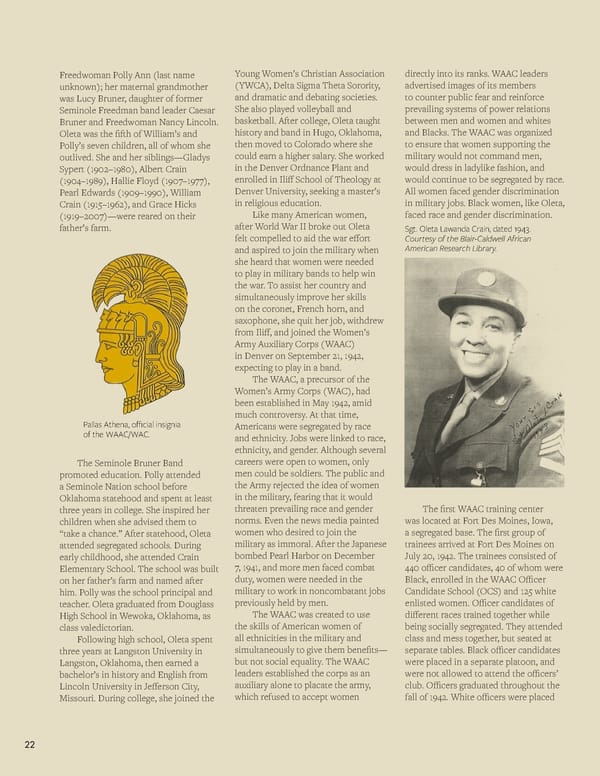Freedwoman Polly Ann (last name Young Women’s Christian Association directly into its ranks. WAAC leaders unknown); her maternal grandmother (YWCA), Delta Sigma Theta Sorority, advertised images of its members was Lucy Bruner, daughter of former and dramatic and debating societies. to counter public fear and reinforce Seminole Freedman band leader Caesar She also played volleyball and prevailing systems of power relations Bruner and Freedwoman Nancy Lincoln. basketball. After college, Oleta taught between men and women and whites Oleta was the fifth of William’s and history and band in Hugo, Oklahoma, and Blacks. The WAAC was organized Polly’s seven children, all of whom she then moved to Colorado where she to ensure that women supporting the outlived. She and her siblings—Gladys could earn a higher salary. She worked military would not command men, Sypert (1902–1980), Albert Crain in the Denver Ordnance Plant and would dress in ladylike fashion, and (1904–1989), Hallie Floyd (1907–1977), enrolled in Iliff School of Theology at would continue to be segregated by race. Pearl Edwards (1909–1990), William Denver University, seeking a master’s All women faced gender discrimination Crain (1915–1962), and Grace Hicks in religious education. in military jobs. Black women, like Oleta, (1919–2007)—were reared on their Like many American women, faced race and gender discrimination. father’s farm. after World War II broke out Oleta Sgt. Oleta Lawanda Crain, dated 1943. felt compelled to aid the war effort Courtesy of the Blair-Caldwell African and aspired to join the military when American Research Library. she heard that women were needed to play in military bands to help win the war. To assist her country and simultaneously improve her skills on the coronet, French horn, and saxophone, she quit her job, withdrew from Iliff, and joined the Women’s Army Auxiliary Corps (WAAC) in Denver on September 21, 1942, expecting to play in a band. The WAAC, a precursor of the Women’s Army Corps (WAC), had been established in May 1942, amid much controversy. At that time, Pallas Athena, official insignia Americans were segregated by race of the WAAC/WAC. and ethnicity. Jobs were linked to race, ethnicity, and gender. Although several The Seminole Bruner Band careers were open to women, only promoted education. Polly attended men could be soldiers. The public and a Seminole Nation school before the Army rejected the idea of women Oklahoma statehood and spent at least in the military, fearing that it would three years in college. She inspired her threaten prevailing race and gender The first WAAC training center children when she advised them to norms. Even the news media painted was located at Fort Des Moines, Iowa, “take a chance.” After statehood, Oleta women who desired to join the a segregated base. The first group of attended segregated schools. During military as immoral. After the Japanese trainees arrived at Fort Des Moines on early childhood, she attended Crain bombed Pearl Harbor on December July 20, 1942. The trainees consisted of Elementary School. The school was built 7, 1941, and more men faced combat 440 officer candidates, 40 of whom were on her father’s farm and named after duty, women were needed in the Black, enrolled in the WAAC Officer him. Polly was the school principal and military to work in noncombatant jobs Candidate School (OCS) and 125 white teacher. Oleta graduated from Douglass previously held by men. enlisted women. Officer candidates of High School in Wewoka, Oklahoma, as The WAAC was created to use different races trained together while class valedictorian. the skills of American women of being socially segregated. They attended Following high school, Oleta spent all ethnicities in the military and class and mess together, but seated at three years at Langston University in simultaneously to give them benefits— separate tables. Black officer candidates Langston, Oklahoma, then earned a but not social equality. The WAAC were placed in a separate platoon, and bachelor’s in history and English from leaders established the corps as an were not allowed to attend the officers’ Lincoln University in Jefferson City, auxiliary alone to placate the army, club. Officers graduated throughout the Missouri. During college, she joined the which refused to accept women fall of 1942. White officers were placed 22
 December 2022 Oklahoma Hall of Fame Magazine Page 23 Page 25
December 2022 Oklahoma Hall of Fame Magazine Page 23 Page 25